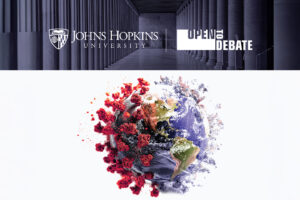
Five years after the first cases of COVID-19 were detected in the United States, the pandemic continues to shape daily life. It left millions of people dead, strained health systems, and frayed trust in institutions. The Centers for Disease Control and Prevention (CDC) and the World Health Organization responded in real time to shifting science and immense uncertainty. Communities faced their own challenges as they responded to misinformation, mistrust, and official guidance that shifted with new scientific understanding.
These realities frame questions that have yet to be fully answered: where did the pandemic response break down, and what does that teach us about the responsibilities of both public health systems and the societies they serve?
Those questions will be the focus of the next installment of The Hopkins Forum, a debate series presented by Open to Debate and the SNF Agora Institute. The event will take place on Wednesday, September 17, 2025, at 6:30 p.m. at 525 N. Wolfe Street, Baltimore, MD. “COVID-19 exposed deep vulnerabilities, but it also sparked innovation and redefined resilience. This debate aims not only to reflect on the past but also to help shape more effective, compassionate, and forward-thinking policy decisions for the future. The goal is to offer a safe, contempt-free, and fact-based forum. We hope audiences will learn something new, think critically, and be inspired to seek out similar exchanges with people in their own lives,” said Lia Matthow, Chief Content Officer at Open to Debate.
The evening will open with remarks from Adam Seth Levine, SNF Agora Professor of Health Policy and Management. Levine studies how people with different expertise and experiences work together to improve the communities they share. “One of the hallmark features of any new public health crisis like COVID-19 is that things are highly uncertain,” he said. “Scientists are uncertain about the nature of the threat. The public is uncertain about how worried to be. Community leaders are uncertain about what to say. Policymakers are uncertain about which responses will be effective, ethical, legal, politically acceptable, and economically feasible.”
For Levine, this makes collaboration the essential lesson. “Public health inherently entails collective action, and very diverse people need to find a way to work together,” he said. He points to partnerships that proved vital during COVID-19, from health departments working with schools and social workers to sanitation workers and state officials. He points out that forming such relationships during a crisis is especially challenging. Differences in trust, capacity, and authority can slow collaboration, and people are often unsure how to relate across sectors.
“Cross-sector collaboration is vital to public health, but it depends on people already knowing how to relate to each other, speaking the same language, and trusting each other,” Levine said. “We need to build these relationships well in advance.”
He hopes the debate sparks a forward-looking conversation. “Regardless of who you think bears responsibility for the last pandemic, we have to be prepared for the next one,” he said. “This debate should inspire thoughts of new possibilities. Ask yourself: What kinds of collaborative relationships do we need to protect public health in the communities I am part of? Do we have them? If not, why not, and what can we do about it?”
The debate brings together four national figures who experienced the pandemic from distinct vantage points:
- Dr. Tom Frieden, former CDC director and now president and chief executive officer of Resolve to Save Lives, led New York City’s tuberculosis control program and later supported India’s Revised National Tuberculosis Control Program through the World Health Organization.
- Dr. Jerome Adams, the 20th surgeon general of the United States, served as the operational head of the U.S. Public Health Service Commissioned Corps, where he oversaw more than 6,000 uniformed health officers during multiple health emergencies, including the COVID-19 pandemic.
- Dr. Dara Kass, a practicing emergency physician in New York City, became a trusted public voice as she appeared regularly on national cable news and other media to help audiences separate fact from rumor.
- Doctor Mike Varshavski, a board-certified family medicine physician and UNICEF ambassador, built one of the most influential medical platforms in the world and has used it to counter misinformation and share reliable, evidence-based guidance.
Together, they will debate whether public health systems failed to prepare and communicate clearly, or whether the greater failure was societal: mistrust, misinformation, and resistance to basic measures that left robust public health agencies and emergency response networks struggling to succeed.
The pandemic revealed both vulnerabilities and resilience across our systems and communities. This conversation asks what it will take to strengthen trust, build preparedness, and carry those lessons into the future.

